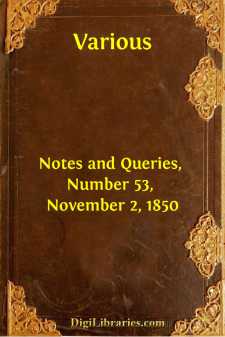Categories
- Antiques & Collectibles 13
- Architecture 36
- Art 48
- Bibles 22
- Biography & Autobiography 813
- Body, Mind & Spirit 142
- Business & Economics 28
- Children's Books 17
- Children's Fiction 14
- Computers 4
- Cooking 94
- Crafts & Hobbies 4
- Drama 346
- Education 46
- Family & Relationships 57
- Fiction 11829
- Games 19
- Gardening 17
- Health & Fitness 34
- History 1377
- House & Home 1
- Humor 147
- Juvenile Fiction 1873
- Juvenile Nonfiction 202
- Language Arts & Disciplines 88
- Law 16
- Literary Collections 686
- Literary Criticism 179
- Mathematics 13
- Medical 41
- Music 40
- Nature 179
- Non-Classifiable 1768
- Performing Arts 7
- Periodicals 1453
- Philosophy 64
- Photography 2
- Poetry 896
- Political Science 203
- Psychology 42
- Reference 154
- Religion 513
- Science 126
- Self-Help 84
- Social Science 81
- Sports & Recreation 34
- Study Aids 3
- Technology & Engineering 59
- Transportation 23
- Travel 463
- True Crime 29
Notes and Queries, Number 53, November 2, 1850
by: Various
Categories:
Description:
Excerpt
NOTES
SHAKSPEARE AND MARLOWE.
A special use of, a use, indeed, that gives a special value to your publication, is the communication through its means of facts and conclusions for the information or assistance of editors or intending editors. I do not suppose that any gentleman occupying this position would be guilty of so much disrespect to the many eminent names which have already appeared in your columns, as would be implied in not giving all the attention it deserved to any communication you might see fit to publish; and with this feeling, and under this shelter, I return to the subject of Marlowe, and his position as a dramatic writer relative to Shakspeare. I perceive that a re-issue of Mr. Knight's Shakspeare has commenced, and from the terms of the announcement, independently of other considerations, I conclude that the editor will take advantage of this opportunity of referring to doubtful or disputed points that may have made any advance towards a solution since his previous editions. I have read also an advertisement of an edition of Shakspeare, to be superintended by Mr. Halliwell, which is to contain the plays of "doubtful authenticity, or in the composition of which Shakspeare is supposed only to have taken a part." Neither of these gentlemen can well avoid expressing an opinion on the subject I have adverted to, and to them more especially I would address my observations.
I think I have observed that the claims of Marlowe have been maintained with something very like party spirit. I have seen latterly several indications of this, unmistakeable, though expressed, perhaps, but by a single word. Now it is true both Mr. Collier and Mr. Dyce are committed to a positive opinion on this subject; and it would be unreasonable to expect either of those gentlemen to change their views, except with the fullest proof and after the maturest consideration. But who, besides these, is interested in maintaining the precedence of Marlowe? These remarks have been called forth by an article in the Athenæum, containing the following passages:—
"All Marlowe's works were produced prior, we may safely assert, to the appearance of Shakspeare as a writer for the stage, or as an author, in print.
"It is now universally admitted among competent critics, that Shakspeare commenced his career as a dramatic author, by remodelling certain pieces written either separately or conjointly by Greene, Marlowe, Lodge, and Peele."
An anonymous writer commits himself to nothing, and I should not have noticed the above but that they illustrate my position. In the passage first cited, if the writer mean "as a writer for the stage in print," it proves nothing; but if the words "in print" are not intended to be so connected, the assertion cannot be proved, and many "competent critics" will tell him it is most improbable. The assertion of the second quotation is simply untrue; Mr. Knight has not admitted what is stated therein, and if I recollect right, an Edinburgh Reviewer has concurred with him in judgment....












